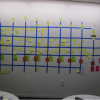 |
Broadening Your Perspective with Logic-Bubbles Naomi Karten explains how logic-bubbles, those bubbles of perception within which a person is acting, can help you navigate the relationships between your team members. When people have perspectives different from yours, it could be that they’re misinformed, ignorant, or incompetent. But it could also be that their perspectives are as well-founded as your own when considered within their particular logic-bubbles.
|
|
 |
The Rules of Engagement for Workplace Book Clubs Cindy Yuill explains how workplace book clubs can benefit yourself and your team as software testers and developers. In a workplace book club, members get together to form a connection with others, hear different points of view, debate, learn, and get advice and support from each other.
|
|
 |
Moving Beyond the Backlog: The Four Quadrants of Product Ownership What do you consider the role of product owner in an agile development project to be? Bob presents a compelling perspective that a product owner has four distinct critical roles that can prove impactful to a team's success.
|
|
 |
Management Myth 22: If You’re Not Typing, You’re Not Working Some managers who have not been technical in a while have forgotten—or may never have known—that software product development is about learning. They may have spent all of their learning time at a keyboard. Especially if they learned alone rather than in teams, they would not know how to assess a team member’s need for alone time after intense team time.
|
|
 |
How to Deal With Overly Agreeable People Dealing with overly agreeable people can be fraught with obstacles quite different than those usually associated with the stereotypical stubborn geek who seems unable to bend or compromise. This article will help you understand and deal with the unexpectedly challenging aspects that you may experience interacting with some agreeable people.
|
|
|
|
Management Myth 21: It’s Always Cheaper to Hire People Where the Wages Are Less Expensive Johanna Rothman bucks conventional wisdom and writes that it's not always cheaper to hire workers from places where the wages are less expensive. When you have fractions of teams in remote places, you could have communication problems and other issues that will increase the cost for every feature.
|
|
 |
The Gamification of Software Testing—An Interview with Christin Wiedemann
Podcast
Christin Wiedemann describes how adding gamification to the workplace shouldn't be difficult in a world driven by gaming. Learn how creativity and team building are boosted by fun and trust.
|
|
 |
How to Deal with Paranoia in the Workplace One of the most difficult personality types to deal with is the person who always seems mistrustful of others. Sometimes, this lack of trust is justified, but sometimes it is really a manifestation of some dysfunctional personality issue. This article will help you understand this situation and suggest a few ways you can deal with difficult personality types like the paranoid person.
|
|
|
|
To Manage Change, Recognize That It Entails Loss Adjusting to change entails coming to terms with loss. Keep that in mind if you want to ease the challenge people face in coping with change. In this article, Naomi Karten describes someone who never learned this lesson and what he might have done differently.
|
|
|
|
Management Myth 20: I Can Compare Teams (and It’s Valuable to Do So) Johanna Rothman explains that you cannot measure what people do and expect that measure to be useful. Why? Because software is a team sport, and everything we do depends on other people.
|
|

